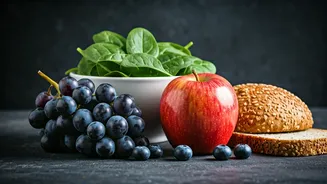Kidney Function: An Overview
The kidneys are crucial organs, acting as the body's natural filtration system. They eliminate waste and excess fluids while also regulating blood pressure,
maintaining electrolyte balance, and producing essential hormones. However, the kidneys are prone to various health issues. Kidney disease can result from factors like high blood pressure, diabetes, and unhealthy lifestyle choices. Chronic kidney disease (CKD) is a serious condition that can progressively damage the kidneys over time. By understanding the kidneys’ importance and potential threats, people can be more mindful of dietary and lifestyle choices that affect renal health. Diet plays a vital role in kidney health, with the correct foods being capable of improving filtration and overall kidney function. The five foods discussed below, which are readily available, are excellent choices to support kidney health, enhancing natural detoxification processes.
Garlic: Powerful Cleanser
Garlic is a well-known culinary ingredient and a potent natural remedy. It is loaded with antioxidants, which assist in safeguarding cells against damage. Garlic’s capacity to reduce inflammation is particularly beneficial for kidney health. Studies suggest that garlic can assist in lowering blood pressure, a key risk factor for kidney disease. By including garlic in your daily meals, you can offer your kidneys extra protection against the damage caused by high blood pressure. Moreover, garlic is known for its diuretic properties, which help the kidneys remove excess sodium and water. The sulfur-containing compounds present in garlic have been demonstrated to aid in detoxifying the kidneys, boosting their efficiency. Eating garlic raw, as a supplement, or in cooked dishes is an easy way to incorporate its advantages into your daily life. Consider adding chopped garlic to your salads, stir-fries, or incorporating it into your favorite sauces for a flavourful and kidney-friendly meal.
Cranberries: UTI Fighter
Cranberries are widely recognised for their benefits in urinary tract health. The antioxidants and other compounds present in cranberries prevent bacteria, particularly E. coli, from adhering to the walls of the urinary tract. This mechanism is particularly helpful in preventing urinary tract infections (UTIs), which, if left untreated, can affect the kidneys. Frequent UTIs increase the risk of kidney infection. Cranberries can reduce this risk. Cranberries can also help to acidify urine, creating an environment that inhibits bacterial growth. Whether consumed as fresh cranberries, cranberry juice (without added sugar), or in supplement form, cranberries offer a simple yet powerful way to promote kidney health. Cranberry juice, in particular, is a convenient method to benefit from the advantages of cranberries. It can be added to your daily diet, providing a tasty approach to promoting kidney health. However, always choose cranberry juice with little to no added sugar.
Red Bell Peppers: Vitamin C Source
Red bell peppers are packed with beneficial nutrients, including vitamin C, which is a potent antioxidant. Vitamin C helps protect the kidneys from oxidative damage and supports their overall function. Red bell peppers are low in potassium, which can be helpful for individuals with kidney problems. Diets high in potassium may be harmful to individuals with compromised kidney function because the kidneys struggle to regulate electrolyte balance. Including red bell peppers in your diet can provide essential nutrients without overloading the kidneys. These peppers can be used in a variety of ways. They can be eaten raw, added to salads, roasted, or incorporated into cooked dishes. Their adaptable nature makes them an easy addition to your daily meals, boosting kidney health.
Cabbage: Antioxidant Powerhouse
Cabbage is a cruciferous vegetable, celebrated for its antioxidant content and its support for detoxification. It also helps to remove harmful toxins from the body, which can benefit the kidneys. Cabbage, with its low potassium content, makes it a good option for people with kidney difficulties. It’s also a source of vitamins C, K, and fiber, which are helpful for overall health. Consuming cabbage in your daily diet can aid in the removal of toxins, which enhances kidney function. Cabbage can be eaten raw in salads, fermented as sauerkraut, or cooked in stir-fries and soups. Its adaptability makes it a simple component to add to your daily meals. Consider incorporating cabbage into your regular diet for a simple method to help cleanse and protect your kidneys.
Apples: Fiber Benefits
Apples, well-known for their high fiber content, are beneficial for kidney health by promoting healthy digestion and assisting in the removal of waste products. They also contain antioxidants that protect against cell damage. Apples have a low potassium content, making them appropriate for those with kidney difficulties. High potassium levels can be harmful for those with impaired kidney function. Apples are a convenient and accessible fruit that can be eaten raw, added to salads, or used in smoothies. Apples contribute to a healthy diet by helping the kidneys function properly. Consuming apples regularly offers a tasty and easy way to help cleanse and protect your kidneys. Consider eating an apple with your breakfast or as a snack. Its fiber aids in overall kidney health.



















